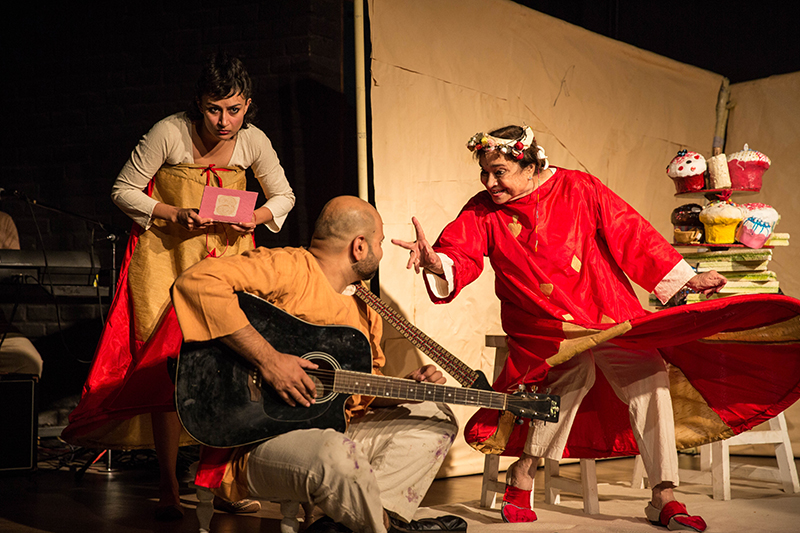Shena Gamat




Grant Period: over one year and six months
Shena Gamat is a theatre practitioner from Delhi with over 15 years of experience. She is the co-founder of Barefoot! Theatre Company. She graduated in English from Delhi University and is currently pursuing a PG Diploma in Theatre for Education and Social Transformation from Shiv Nadar University. She has worked as the Director of Youth and Culture programme at the Society for Labour and Development, New Delhi. She is also a film actor, voice-over artist, movement therapist, experiential learning facilitator and was the co-founder of The Rock Street Journal. Barefoot!’s first production The Pink Balloon received IFA’s support in 2007 under the New Performance programme. Their last production I love you, Let’s Have Sex has done over 30 shows all over the country.
Shena’s current project Snakes is an adaptation of James Alan Gardner’s science fiction Three Hearings on the Existence of Snakes in the Human Bloodstream, that examines how ‘otherness’ is manufactured, magnified and fostered in human societies in a plot that spans from 1400 AD to 2200 Ad in the future. Human societies all over the world today are growing more and more intolerant of people and cultures that are different from or unfamiliar to them. The story engages with this relevant question where the ‘science’ borderlines on fiction while the incidents resemble real life very closely. Shena feels this play becomes especially relevant in present day India where religious doctrines are overruling scientific research and rational thinking with active support from the government.
Through this project Shena also wants to experiment with audience engagements. In her earlier production she found that her plays achieve a different dimension if the audience is intimate and interacts with the performance by asking questions. She wants to make this process a part of her play. She also wants to take this play out of the standard auditorium spaces, which often attract a specific theatre-going audience and alienate others. As a result, she feels, theatre loses potential audience and the issues being engaged with remains within the circuit of the initiated. She wants to challenge this idea and take her play to places where it can come in contact with people who wouldn’t otherwise walk into a theatre auditorium. To achieve this she has decided to perform at community centres run by Resident’s Welfare Associations (RWA) in Delhi. She has already identified some of these associations and is in conversation with them. She has already run a pilot and they seem to be welcoming of the idea. Due to the nature of the audience expected, her performance needs to be easily accessible without diluting the issues and make science fiction less intimidating. Her making also has to shed all the baggage of the proscenium. She has decided to use minimal light, props and costumes and the production will heavily depend on acting which will need intense preparations. Since she invites the audience to question and become part of the production, the play would also have to bear that in mind when it is designed to keep it open-ended and flexible in structure.
There have been sporadic attempts to bring science fiction to theatre in India, and this would be a welcome addition to that repertoire. In terms of using alternative spaces, theatre makers in India have long traditions that include folk and political street theatre, as well as radical experiments of Badal Sarkar’s Third Theatre. In recent times many theatre directors are being forced to find alternative spaces due to rising costs of proscenium work. Many also want to engage with newer audiences and create low budget productions that can be performed at alternative locations. Shena’s work seems to have found a way to bring together a complex theme, an unique approach and the possibility of tapping into unconventional audiences. One of the external evaluators for her proposal said, “I find the project to have formulated its performance grammar, its spatial interests and its relation to the contemporary scenario in a thorough and clear fashion.” For IFA this would also resonate with the efforts of Project 560, which started with a similar search for alternative spaces for performance. If her efforts open new possibilities of audience engagement, there will be learning both for the field as well as IFA. It must also be noted that as in experiments like these, there are risks that the format or theme does not work at all. But even then, there will be learnings from the process that will be valuable for the practice of theatre.
Shena is planning to have two runs of the performance – the first run with three shows and the second run with two shows. While her main focus would be to approach community halls, she also wants to perform in schools, colleges and independent theatre spaces. The production will be the main outcome of the project. Photo and video documentation of the process and performances, audience feedback forms with analysis, audio-visual documentation, post-show informal discussion reports in particular reference to the interactive elements and the theme of the play, and recordings of the original songs and music of the play will be deposited as deliverables to IFA.
